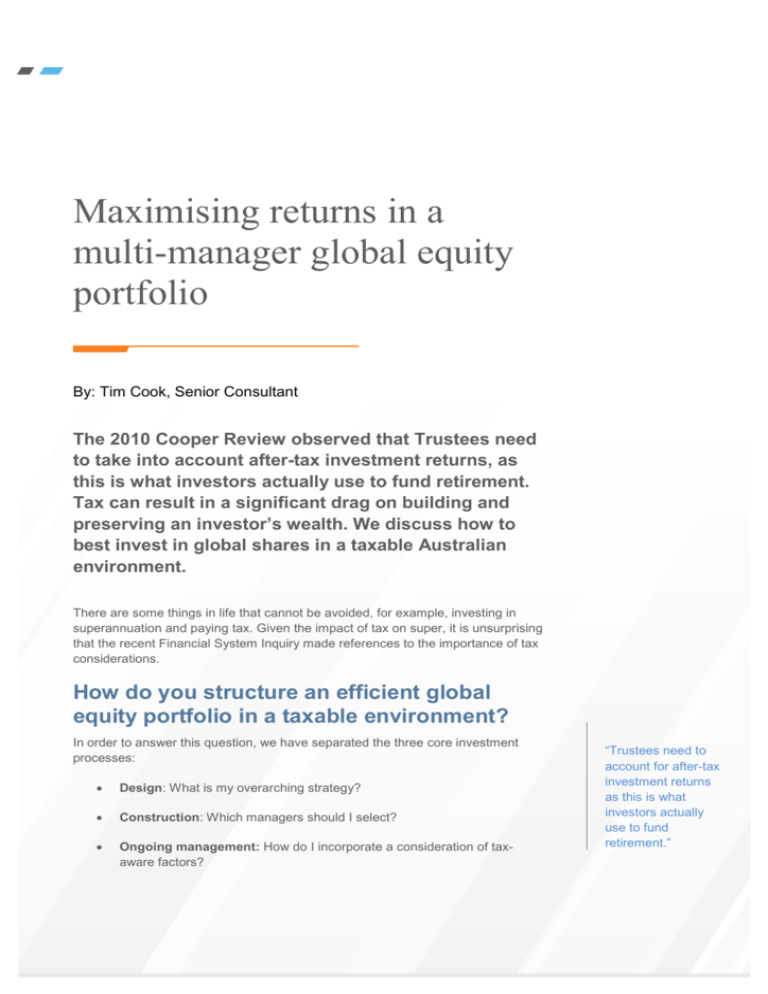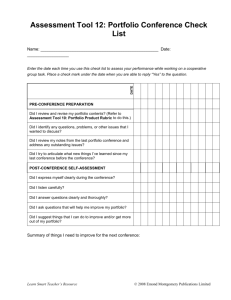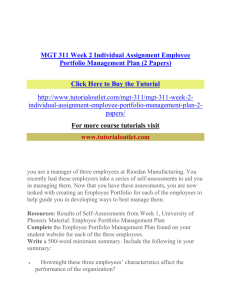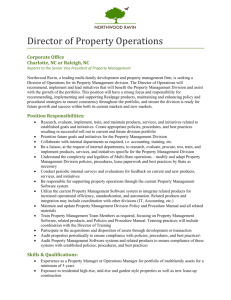
Maximising returns in a
multi-manager global equity
portfolio
By: Tim Cook, Senior Consultant
The 2010 Cooper Review observed that Trustees need
to take into account after-tax investment returns, as
this is what investors actually use to fund retirement.
Tax can result in a significant drag on building and
preserving an investor’s wealth. We discuss how to
best invest in global shares in a taxable Australian
environment.
There are some things in life that cannot be avoided, for example, investing in
superannuation and paying tax. Given the impact of tax on super, it is unsurprising
that the recent Financial System Inquiry made references to the importance of tax
considerations.
How do you structure an efficient global
equity portfolio in a taxable environment?
In order to answer this question, we have separated the three core investment
processes:
Design: What is my overarching strategy?
Construction: Which managers should I select?
Ongoing management: How do I incorporate a consideration of taxaware factors?
“Trustees need to
account for after-tax
investment returns
as this is what
investors actually
use to fund
retirement.”
Design: What is my overarching strategy?
The investment approach should both capture active insights and be tax aware.
In order to increase pre- and post-tax returns, investors typically choose to pursue
an active management approach. However, pre-tax alpha often comes from selling
stocks that have outperformed, in other words, from capital gains disposals. The
taxes paid on these disposals reduce the assets invested and therefore limit the
compounding of returns. That said, purely focusing on a lower level of capital gains
disposals through a passive management approach is not the best way of
increasing your returns either.
Maximising the value of assets invested from lower capital gains disposals allows
your assets to compound on a greater base. In addition, by monitoring assets to
maintain a holding for more than a year, you may qualify for the capital gains tax
discount concession. Maximising returns requires consideration of many factors
including seeking alpha and being tax aware. When considering your global equity
portfolio, considerations include:
1. Active management, despite higher turnover (and increased capital
gains disposals), adds value after tax. Indeed, we expect that a sizable
asset allocation to passive strategies would impact expected returns
materially; and
2. Being tax aware in addition to your active managers’ insights can
increase your returns. Deviations from your active managers’ decisions
can cause differences in return which may be positive or negative. Too
much deviation erodes the added value from the underlying active
manager but small deviations on average lead to higher returns.
Active management adds value and is worth pursuing in a taxable environment.
Construction: Which managers should I
select?
Given that most active managers tend to focus purely on pre-tax alpha, ignoring
common tax aware factors, it pays to select managers that consciously or not, act
in a tax-aware manner.
The efficient construction of a tax-aware global equity portfolio is far more complex
than a simple turnover management exercise. Focussing on managers that use
strategies that are long-term and low turnover in nature and thereby inherently
more tax efficient, will improve returns over the long-term. However, simply
selecting the lowest turnover managers can result in an unhealthy bias towards
value investing that could in turn lead to significant under performance during
certain periods of a full market cycle.
A focus on ‘sustainable growth’ can also involve lower levels of capital gains tax
disposals, as such strategies tend to have lower turnover. Additionally, focusing on
growth stocks tends to lead to lower dividends which, all else being equal,
maximise the level of assets invested.
A careful combination of differing managers and styles is required. Specifically, you
should consider the following aspects in managers’ investment approaches: natural
portfolio turnover, and the preference for long-term versus short-term gains and
income generation. The consistent theme should be one of low turnover created
through a focus on long-term investing.
Ongoing management: How do I incorporate
a consideration of tax-aware factors?
For an Australian investing in global equity portfolios, there are several basic
principles to be aware of. Ideally, we want these to be reflected by our selected
active managers. However, the best global equity managers are often not focusing
on the Australian tax-paying investor – nor should we expect them to be.
The principles or processes below highlight some of the methods of maximising the
level of assets invested that can be implemented through a centralised portfolio
management (CPM) framework, overlaid on the initial active manager portfolios.
The overall principle is a lower level of capital gains disposals allows future
returns to compound on a higher asset base. The power of compound interest can
be very material over longer timeframes and forms the basis for maximising
returns.
Pay attention to the holding period to monitor when assets have been held for
more than a year and qualify for the capital gains tax discount concession.
Reducing turnover will directly reduce trading costs and lower levels of capital
gains tax disposals. The reduction in turnover through careful manager selection
along with the CPM framework will likely add the most value to returns.
Select tax lots – selling lots with a higher cost basis and lower gains maximises
the level of assets invested, all else being equal.
Manage portfolio yield – lower yields on average maximise the level of assets
invested (in a global equity portfolio).
In order to implement or allow efficient implementation of these principles, one
needs to centralise the portfolio management of multiple managers – as this
provides both further opportunities to reduce turnover with lower levels of capital
gains disposals, but also offers the control a (centralised) portfolio manager needs
to successfully implement the preferred overlay strategies described above.
Implementing an active global approach
An active global equity multi-manager portfolio, implemented through a CPM
framework reduces the implementation and is tax aware. This provides a welcome
potential boost to returns, allowing the fruits of successful active management to
persist in an increasingly tax-aware world.
“A careful
combination of
managers and styles
is required.”
For more information, please contact your Russell Investments’ relationship manager or the
following contacts:
INSTITUTIONAL INVESTORS: Contact Divyesh Bhana at 02 9229 5419 or
dbhana@russell.com.
ADVISER BUSINESSES: Contact Paul Carrington at 03 9270 8124 or
pcarrington@russell.com.
Issued by Russell Investment Management Ltd ABN 53 068 338 974, AFS Licence 247185 (RIM). This document provides general information only and has not
prepared having regard to your objectives, financial situation or needs. Before making an investment decision, you need to consider whether this information is
appropriate to your objectives, financial situation or needs. This information has been compiled from sources considered to be reliable, but is not guaranteed.
Copyright © 2015 Russell Investments. All rights reserved. This material is proprietary and may not be reproduced, transferred, or distributed in any form without
prior written permission from Russell Investments.
APRIL 2015









